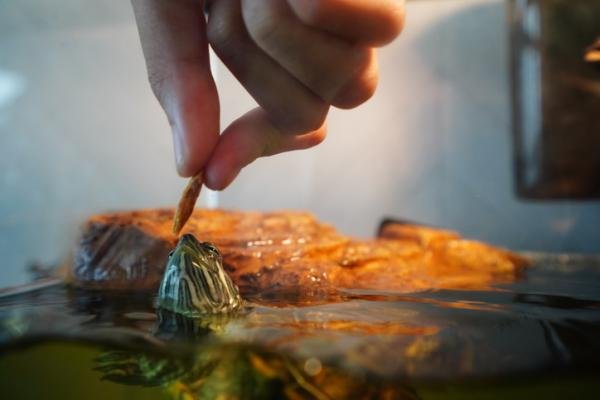If we have a turtle as a pet , it is very important that we monitor its diet, providing it with a diet adjusted to its specific nutritional requirements, which vary from one type and one species to another.
If their diet is not adequate, various health problems can occur, including eye problems, lack of energy or lethargy, respiratory problems and serious mineral and vitamin deficiencies, which have consequences of varying severity. Today, we will look at some of the causes of why my turtle does not eat, as well as what to do about it.

My turtle doesn’t want to eat
First of all, it should be noted that due to the peculiarities of turtles, fasts lasting a few days are frequent, this being a frequent and completely normal event in them. However, if the fast is extended too long it may indicate that something is happening to our turtle.
Why won’t my turtle eat?
Some of the reasons turtles may stop eating include:
- Changes in your environment or routine.
- Changes in the diet supplied.
- Sudden changes in temperature or humidity.
- Changes in the family unit, such as the addition of new members to the family, including pets.
My turtle does not eat anything
When a turtle receives a balanced and balanced diet on a regular basis, “short” periods of fasting usually appear, not counting hibernation, which would be much longer, lasting a few days. But, if it is detected that the turtle does not consume food or drink for a longer time, try to find the reasons, since it may be sick and need veterinary attention.
Symptoms of a sick turtle
Some symptoms of illness in turtles are:
- Lethargy
- Signs of dehydration, noticeable in the color, touch and texture of the skin.
- Closed and / or swollen eyes.
- Alterations in the state of its shell.
If we observe these signs in our pet, it is best to go to the vet as soon as possible, in order to be able to solve problems quickly. Well, some of the diseases that cause a turtle not to eat anything are quite serious, ranging from eye infections to mouth and respiratory disorders or the presence of parasites
My turtle does not eat and has its eyes closed
It is far more common than it seems for a turtle to have eye problems due to its diet. Normally, what happens is that they cannot open their eyes because hypovitaminosis has occurred. This is that there is a vitamin deficiency in the turtle’s body, mainly due to the fact that its diet does not contain the essential vitamins for it.
To correct this problem, it is advisable to go to the veterinarian, as this will be the one to verify if it is indeed hypovitaminosis or some infection by fungi or bacteria. In the case of hypovitaminosis, the treatment includes both a correction of the diet and the application of eye drops rich in vitamin A, usually observing a relatively quick recovery.
My turtle does not eat and sleeps a lot
If we observe that our turtle’s lack of appetite is accompanied by a long and deep sleep, it may simply be hibernating. Yes, turtles, like other animals such as bears, tend to hibernate, as you can see in this other article on Do turtles hibernate? This is completely normal in them, especially in some species.
Hibernation consists of a period in which the turtle enters a state of drowsiness, slowing down the rhythm of operation, thus reducing its vital signs. This is a natural mechanism that allows them to preserve their organic reserves, something that is determined by their genetics, because in the wild, hibernation allows them to survive when food is scarce.
We have to be attentive to the thermal conditions to which the turtle is subjected, since hibernation is typical of those turtles exposed to low temperatures. To regulate the temperature of your cabin, the usual thing is to use UVA and UVB lamps, which are also important for your shell, as we will see just below.
My turtle does not eat and has a soft shell
When the shell of our turtle begins to lose hardness and color, it is essential to take action as soon as possible, otherwise it can lead to serious health problems.
Normally, a soft shell is due to a poor absorption of calcium, as well as a diet deficient in this mineral for a long time. Calcium is vital for the shell to be in good condition, but equally important is that the turtle receives enough UVB light. UVB rays are what allow the turtle’s body to produce vitamin D3, which is necessary for its body to absorb calcium from food.
Therefore, in these cases a diet rich in calcium must be combined with sufficient exposure to UVB rays, resorting to UVB lamps if it is not possible to make the turtle receive direct sunlight for long enough, about 8-10 hours a day. It is the ideal.
